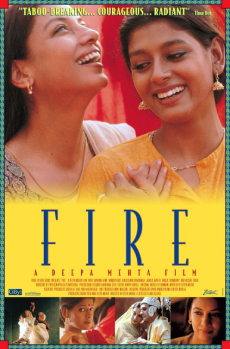Movies
Class, sexuality, and desire
Deepa Mehta’s ‘Fire’ challenges societal norms by exploring the forbidden love between two women in a conservative society.
Rishika Dhakal
“There is no word in our language that can describe what we are and how we feel for each other,” this particular dialogue captures the essence of the main characters’ situation in the movie.
Set in the 1990s, the movie ‘Fire’ explores the romantic relationship that brews between two married women, Radha (Shabana Azmi) and Laxmi (Nandita Das).
Deepa Mehta directed the movie, which is often regarded as a pioneering effort that began a widespread national conversation about lesbian and gay rights in India.
The director, throughout the movie, expresses her resentment towards a social system in which women have no rights and are constantly treated as objects. Mehta meticulously cloaks her anger towards society in the sort of gentle sexuality that is portrayed in the film, which is often more erotic than explicit.
The gustiness of the movie is evident in its opening scene, where the field echoes a flashback conversation among Radha’s family. In a similar field, where Raj from ‘Dil Wale Dulhaniya Le Jaayenge’ once flung open his arms for his Simran, now witnesses a convergence of societal norms and personal truths.
The subsequent scene that follows is set in front of the Taj Mahal. Considered to be made in remembrance of Mumtaz by Shah Jahan, the mausoleum, this time, witnesses the emotional battlefield echoing the legendary conflict of Antony and Cleopatra between the two significant characters of the film.
The opening scenes clearly show that the film in question does not follow the routine portrayal of romance as depicted in the movies of Bollywood maestros such as Karan Johar and Aditya Chopra.
The movie is set in the 1990s in India, where the air of globalisation and modernisation influenced the way people dressed, ate, thought, and conducted themselves.
It features similar distinctive characters. These characters struggle to strike a balance between their original self and their pseudo-self, which was often influenced by Western culture.
One such character is Jatin (Jaaved Jaaferi). In defiance of his preference, Jatin is married to Laxmi. However, he is in love with a Chinese woman.
Laxmi, acting in compliance with her gendered upbringing, is the only one who tries to make their marriage work.
Jatin and Laxmi, their brother Ashok, sister-in-law Radha, their mother Biji, and the affable servant Mundu reside in a joint family setting.
Jatin runs a cassette shop, whereas Ashok owns a sweet shop. Their mother is paralysed and requires constant care. Both bahus (daughters-in-law), Laxmi and Radha, help their husbands run their respective businesses.
Mundu, depicted as a victim of the existing class system, explores his sexual desires behind closed doors. He becomes a deviant, taking advantage of being home alone to engage in self-pleasuring, even when Biji, whom he is supposed to care for in the family’s absence, is present.
This can be contrasted with the liberty enjoyed by the upper-class Jatin, who meets no obstruction from society nor his family when he is allowed to entertain infidelity and sell pornographic cassettes to his customers.
This invariably suggests that those from marginalised backgrounds, like Mundu, face harsher judgement and restrictions compared to those from more privileged backgrounds, like Jatin, who may enjoy more freedoms despite engaging in similar behaviours.
The layers of this family start to peel away as the audience learns about the struggles that each character of the film represents as a member of society.
For instance, after learning about the infertility of his wife, Radha, Ashok takes a vow of celibacy. He clings to the standpoint that sex should serve solely for procreation and nothing else.
Yet, when he is aroused, he tries to control his desire by making his wife sleep beside him. His rationale is to ensure he stays beyond temptation, but this has deprived his wife of sexual pleasure for the past thirteen years.
Ashok represents the “wise patriarchs” of society, whose actions contradict the teachings of the temples they worship in and the ideologies and values of the demigods they have embraced.
The film’s main characters, Laxmi and Radha, form a romantic relationship after their husbands neglect their emotional and physical needs.
Gradually, the duo falls in love with each other. They have their moment of pleasure-making where both seek each other’s emotional embrace. They explore the unfulfilled yet profound depths of their love, born not out of desire but from the universal feeling of love itself.
At this particular juncture, the film makes one feel that women’s transgression is not an attack against patriarchy but a bold move to discover one’s feelings and desires.
‘Fire’ draws themes from the Hindu epic Ramayana to present the parallel conditions of the mythical Sita and the many Sita of contemporary society, represented by Nandita Das.
By being a part of the present rituals like Karva Chauth, which symbolises a wife’s love and devotion to their husbands, the women of contemporary society are repeatedly subjected to the modern Agni-Pariksha, where they are bound to prove their chastity, innocence, and loyalty to their husbands.
In retrospect, the film prompts a reevaluation of the common glorification of Ram and Sita as the ideal pair in the modern world.
The director of the film asserts, “Lesbianism is just another aspect of the film.” And rightly so, the film goes on to explore veiled issues such as class intersectionality, sexuality and pleasure, and queer feminism.
When Ashok, in the film, walks in during an intimate scene between Radha and Sita, he angrily calls his wife a “Shameless bitch”.
This reflects the general people’s disgust towards non-heteronormative relationships and the stigmatisation faced by those who deviate from traditional gender and sexual norms.
The film touches base on the practice of penile-vaginal penetration. The philandering husband, Jatin, tries to have sex with Laxmi without any foreplay, which suggests a lack of consideration for her pleasure and intimacy.
Kate Chopin’s novel ‘The Awakening’ shares thematic parallels with Deepa Mehta’s Fire in its exploration of women's liberation, self-discovery, and defiance of societal norms.
For instance, the decision of Sita and Radha to be together signifies them having control of their agency. Similarly, In ‘The Awakening’, Edna’s symbolic act of walking into the sea represents her final escape from societal constraints and a tragic assertion of her desire for freedom.
Both of these incidents represent a poignant assertion of their desire for personal autonomy from societal expectations.
The only downside of this film is that the two women, Radha and Sita are drawn to each other by their shared unhappiness in their marriages.
This leads to the argument that to love another woman, Sita and Radha each had to first hate the men in their lives. However, it is to be noted that sexuality is not a choice made out of convenience but a natural expression of love and desire that transcends societal norms.
Fire

Director: Deepa Mehta
Starring: Nandita Das, Shabana Azmi, Jaaved Jaaferi
Duration: 1h 44m
Language: English




 15.87°C Kathmandu
15.87°C Kathmandu











